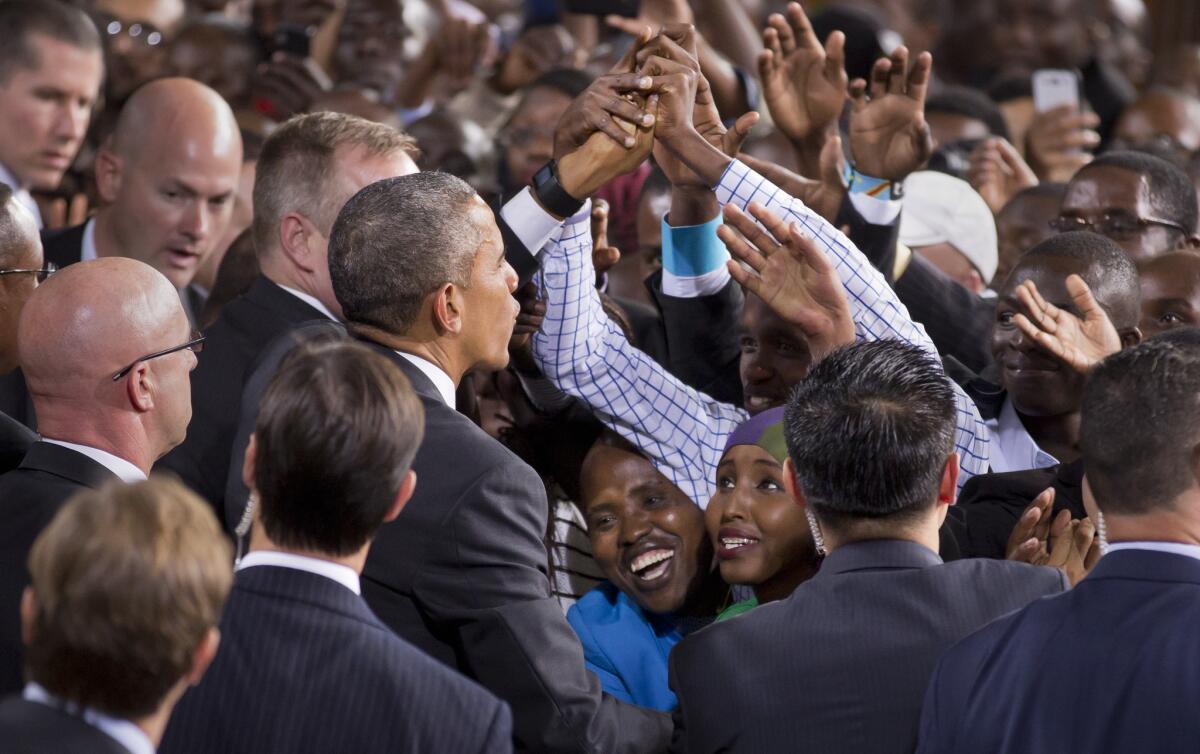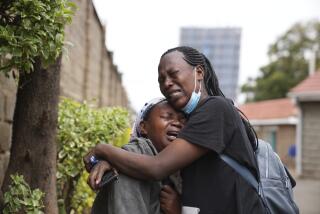Obama strikes a chord with Kenyan women

Two Kenyan women look up as President Obama reaches out to shake hands as he departs after delivering a speech at the Safaricom Indoor Arena in the Kasarani area of Nairobi, Kenya, on Sunday.
reporting from nairobi, kenya — Esther Nduta dreamed of finishing school and starting a business, but her parents took her out of school when she was 14 because they couldn’t afford the fees. Now she spends her days doing menial jobs such as washing clothes and dishes to pay her younger brother’s school fees.
Another of her brothers has already finished school.
She would love to go to night school and finish her education, but she cannot afford to pay.
She insists that it doesn’t anger or frustrate her: That’s just the way things work in Kenya for millions of girls and young women. In Kenya, when a family is short of money to pay high school fees, they take their daughters out of school, but do their best to leave their sons in.
“There was nothing I could do. I didn’t have any way to support myself,” the 26-year-old said Sunday on a Nairobi street.
That sense of dull acceptance of her fate portrays as much as anything else how far Kenya has to go to achieve gender equality, particularly in rural areas.
President Obama, who has delivered tough messages to Kenyans on corruption and anti-gay discrimination, warned Sunday that countries that locked women out of schooling, opportunities and jobs would see their economies shrivel and lag behind other nations.
“Any nation that fails to educate these girls or maximize their potential is doomed to fall behind in the global economy,” he said. Obama said the tradition of treating women as second-class citizens, beating them and denying them the same opportunities as men was wrong.
“These are bad traditions. They need to change. They’re holding you back,” he told a Kenyan audience in his final speech before leaving the country.
“Just because something is part of your past doesn’t make it right. It doesn’t mean it defines your future,” Obama said.
He added that it was not acceptable in the 21st century for young girls to be married off, or subjected to female genital mutilation, a practice which endures in many parts of Kenya, although it is illegal.
Nduta said boys in her rural village of Nanyuki in central Kenya sometimes had to work odd jobs to pay their school fees. Girls couldn’t do that, because they were given too much domestic work at home.
“In the remote areas, the community expects the girls to work in the kitchen and to do a lot of work in the home,” she said. “Life is difficult.”
Like most girls in the village, she was sent to toil on her family’s small subsistence farm when she was taken out of school. She spent two years there before she left home and went to the capital, Nairobi, desperate for a new start.
“Unless you can find groups like NGOs to get you out of that bondage, then life becomes difficult. The only other way out is to come to the city and get a job doing domestic work,” she said.
She said she worked for a short time as a hotel cashier before losing her job. She said she survives “by the mercy of God.”
Angela Kinyua, 25, from the same village, also left school at 14, and worked as a domestic and a shop sales clerk. But she had to return to her rural village for a month when her grandmother became ill. When she returned, the job was gone.
Girls taken from school in rural areas had no choice but to farm or sell vegetables in the market. “They lead miserable lives,” said Kinyua, who dreams of opening a beauty and cosmetics shop.
Her younger sister is still at school. “I want her to remain in school and get a good job,” she said.
Kakenya Ntaiya, a gender equality activist, said many Kenyan women faced domestic violence, while many girls were removed from school, married off early and subjected to genital mutilation. She founded a non-government organization, the Kakenya Center for Excellence, which campaigns against genital mutilation and empowers girls through education.
NEWSLETTER: Get the day’s top headlines from Times Editor Davan Maharaj >>
“Getting a job for a Kenyan woman is still difficult,” she said. “The women in Kenya still face a lot of challenges. I think that message needed to come out loud and that is what he [Obama] did.”
Ntaiya said Obama’s condemnation of female genital mutilation would be supported by most Kenyan politicians, because the practice is illegal, but there was still resistance in remote rural communities.
“When you go to community level, it’s a different reality,” she said. “You are talking about traditions that have been around for many years. When you take it down to village level, it still takes time for people to understand and to realize that this should not be happening.”
Follow @RobynDixon_LAT for news from Africa
MORE:
In Kenya, Obama stresses corruption’s stifling effect on business
In Kenyan village, Obama’s decision not to visit comes as a shock
The tense exchange between Obama and Kenya’s president on gay rights
More to Read
Sign up for Essential California
The most important California stories and recommendations in your inbox every morning.
You may occasionally receive promotional content from the Los Angeles Times.










